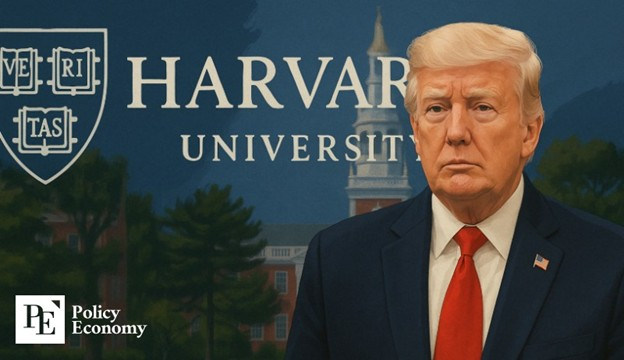Trump Orders Federal Agencies to Cancel Contracts with Harvard University
Input
Modified
Trump Intensifies Financial Pressure on Harvard Once Again Federal Government Moves to Block Foreign Student Enrollment Will the Backlash Against International Students Ultimately Hurt the U.S.?

In a bold move that signals the intensifying ideological clash between the White House and elite academia, President Donald Trump has directed federal agencies to sever all contractual ties with Harvard University. This dramatic order comes on the heels of efforts to curtail the university’s ability to recruit international students, marking a widening campaign by the Trump administration to challenge what it views as politically biased practices within Ivy League institutions. As the confrontation escalates, Harvard finds itself at the epicenter of a larger cultural and political battle—one with profound implications for academic freedom, global education, and America’s soft power.
Federal Retaliation: Harvard Faces Contract Cancellations and Financial Pressure
On May 27, The New York Times reported that the U.S. General Services Administration (GSA) had sent a directive to all federal agencies requiring them to identify any active contracts with Harvard and submit formal termination or transition plans by July 6. This signals the federal government’s intention to unilaterally withdraw from partnerships with the university, a step described by some officials as unprecedented in modern U.S. academic policy.
According to NBC News and the Associated Press, Harvard currently holds approximately 30 federal contracts in sectors such as healthcare, national security, and education. The total value of these contracts is estimated at around USD 100 million. If terminated, these cancellations would deal a significant financial blow to the university’s research and operations. This move adds to a broader pattern of retaliation: earlier, the Trump administration revoked USD 2.7 billion in federal support previously allocated to Harvard and even urged the IRS to strip the university of its tax-exempt status.
The GSA defended the contract termination directive as a measure to “strengthen citizenship.” The administration claims that Harvard is in violation of the Supreme Court’s 2023 ruling banning race-based admissions policies. Moreover, it accuses the university of responding inadequately to reported incidents of harassment targeting Jewish students on campus. These allegations have become a cornerstone of the administration’s argument that elite universities like Harvard promote divisive ideologies and fail to uphold constitutional standards.

Campus Culture Wars and the Fight Over International Students
At the heart of the conflict lies a deeper ideological struggle. President Trump and his administration have frequently accused Ivy League institutions of harboring anti-Israel sentiment and fostering left-leaning political culture through initiatives like DEI—diversity, equity, and inclusion. These programs, once widely promoted as steps toward a more inclusive campus, are now targets of federal scrutiny and political attack. The administration argues that DEI efforts are ideologically biased and has called for their wholesale removal from federally funded academic institutions.
Harvard has firmly resisted these demands, asserting that such actions constitute a violation of academic freedom and institutional independence. The university’s opposition, however, has only provoked more aggressive responses. On May 22, the Trump administration notified Harvard that it would revoke its Student and Exchange Visitor Program (SEVP) certification—a necessary status for institutions that wish to enroll international students. Without SEVP certification, Harvard would be legally barred from admitting foreign students, a blow that would severely damage its global academic standing.
Harvard responded swiftly by filing for a preliminary injunction. The U.S. District Court in Massachusetts temporarily halted the government’s move, warning that the university could suffer “irreparable harm” if the SEVP decertification went into effect.
When that effort stalled, President Trump pivoted to a different tactic. On May 25, he took to Truth Social, claiming that “one-third of Harvard’s students are foreign nationals, including some from countries unfriendly to the United States.” He demanded that Harvard submit the names and countries of origin of all its international students—an extraordinary request that sparked immediate backlash. The university reportedly declined to comply, citing concerns over privacy and discrimination.
Undeterred, Trump doubled down the next day, announcing plans to reallocate USD 300 million in federal funds earmarked for Harvard and direct them instead to support vocational schools. This threat added yet another layer to the administration’s multifaceted pressure campaign—one that uses funding, regulatory status, and public opinion as weapons in an increasingly politicized battle over the future of higher education.
Global Consequences: Eroding U.S. Soft Power and Educational Influence
While the administration frames its crackdown as a necessary corrective to elite academic overreach, critics warn that these actions may backfire—undermining America’s long-standing position as a global education hub and diminishing its soft power. According to Harvard’s Office for International Affairs, 27.2% of the student body (6,793 students) are international students for the 2024–2025 academic year.
A breakdown of the university’s October 2024 data reveals that the largest contingent of international students comes from China, followed by Canada, India, South Korea, and the United Kingdom. These students are more than just learners—they are vital contributors to the U.S. economy, innovation pipeline, and international diplomacy.
The Washington Post reported that over 1 million foreign students enroll annually at U.S. universities, playing key roles in advancing research, technology, and entrepreneurship. Esther Brimmer, Executive Director of NAFSA: Association of International Educators, emphasized that many international graduates go on to power America’s startup ecosystems, while those who return home often become crucial diplomatic bridges between their home countries and the United States.
Economically, the impact is massive. NAFSA estimated that during the 2023–2024 academic year, international students contributed USD 43.8 billion to the U.S. economy, including spending on tuition, housing, transportation, and other living expenses. At Harvard alone, international students generated an estimated USD 384 million—a figure that underscores how deeply global talent is woven into the fabric of American higher education.
The fear among educators and diplomats alike is that restrictive policies and politicized rhetoric may drive top talent to other nations, weakening America’s influence not just in science and technology but in global thought leadership. Harvard’s battle, in this context, is more than an institutional dispute—it is a test case for the future of American higher education in a rapidly shifting geopolitical landscape.





















